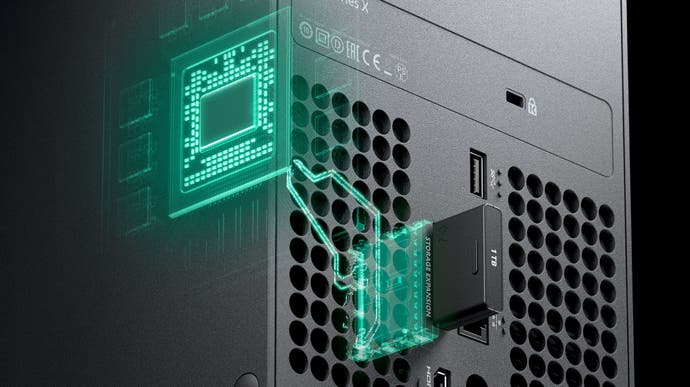Xbox Series SSD hard drive storage explained, from Storage Expansion Cards to speed and size
How Xbox Series X and Series S's super fast hard drive works - and how you can expand it.
The Xbox Series's hard drive enables several of the console's new unique features.
Combining the SSD (solid state drive, where game downloads will be installed) within every console with various technologies under the banner of Xbox Velocity Architecture enables much faster loading times than previous console generations, as well as and quick resuming between multiple games.
Xbox has also confirmed how you can use Xbox Series Storage Expansion Cards to give more hard drive space beyond what ships inside the console, as well as USB 3.1 drives already supported on current gen consoles.
This page explains the Xbox Series SSD speeds and features it enables as what to expect from the size and expansion options at launch.
On this page:
- How does Xbox Series's SSD work, and what are the benefits over the Xbox One HDD?
- How big is the Xbox Series X and Xbox Series S's hard drive storage?
- How you can expand Xbox Series X and Xbox Series X storage with Expansion Cards
- How you can expand Xbox Series X and Xbox Series X storage with USB 3.1 hard drives
We know several other things about Microsoft's new console - including Xbox Series X specs, confirmed Xbox Series X games, the Xbox Series X controller details and the Xbox Series X console design.
How does Xbox Series's SSD work, and what are the benefits over the Xbox One HDD?
As with the PS5 SSD, the Xbox Series X and Xbox Series S is built around a custom SSD solution.
This, combined with various 'Xbox Velocity Architecture' technologies, allow for more consistent load time performance and features unique to the console.
Here's what the Xbox Series SSD provides:
- The ability for the console to access 2.4 GB/s of data per second - or 4.8GB/s uncompressed - which is around 40 times than what's possible on Xbox One currently.
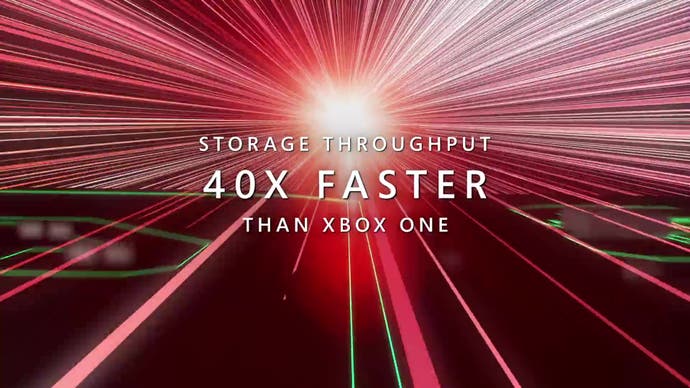
- The headline benefit this brings is faster load times; Microsoft released a video of how State of Decay 2 runs on Xbox One X versus on Xbox Series via backwards compatibility, with the previous generation console taking around 50 seconds, and the Series 8-10 seconds:
- The custom SSD is designed around "sustained performance" and not "peak performance", according to Microsoft. "Many PC SSDs 'fade' in performance terms as they heat up - and similar to the CPU and GPU clocks," explains Digital Foundry when breaking down the final specs, and so by having a new form factor, allows for more consistent performance. What does this mean in practice? It allows developers to plan and design for constant load and asset access times for their Xbox Series games.
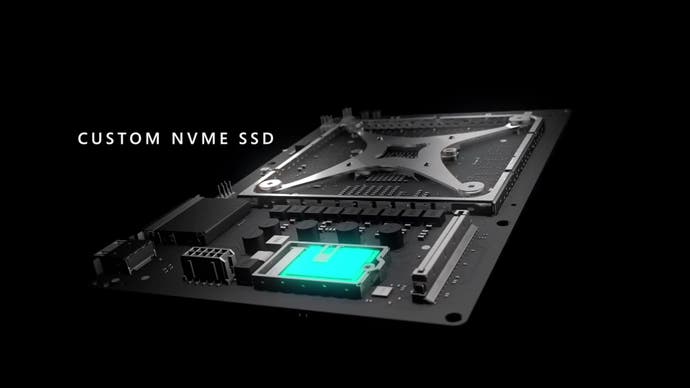
- The SSD storage to also used to augment memory through the various technologies under the 'Xbox Velocity Architecture' umbrella. "The idea, in basic terms at least, is pretty straightforward - the game package that sits on storage essentially becomes extended memory, allowing 100GB of game assets stored on the SSD to be instantly accessible by the developer," continued Digital Foundry in the breakdown - which also explains more about the other Velocity Architecture technologies technologies at play, from Sampler Feedback Streaming to high-speed hardware decompression, if you want the ins and outs of how this works:
- A feature this enables is 'Quick Resume', where multiple games can be suspended mid-play and resumed within seconds. Microsoft released a video showing this in action using several Xbox One games through backwards compatible, and though the number of games supported in Quick Resume wasn't confirmed - likely due to the variation in memory each game would use up - a minimum of three Series X games will be supported:
How big is the Xbox Series X and Xbox Series S's hard drive storage?
Depending on which Xbox Series console you are getting, the built-in storage capacity differs.
- The Xbox Series X will come with a 1TB Custom NVMe SSD at launch - in other words, 1,000 GB.
- The Xbox Series S will come with a 512GB Custom NVMe SSD at launch - half that of the Series X.
Regardless of which model you get, the upshot is it's much, much faster than any Xbox One's hard drive - even your own installed SSD, thanks to other Xbox Series X technologies designed to make the most of it.
Again, here's Digital Foundry with a comparison of what the Xbox Series X storage offers at a glance:
| Xbox Series X | Xbox Series S | Xbox One X | Xbox One S | |
|---|---|---|---|---|
| Internal Storage | 1TB Custom NVMe SSD | 512GB Custom NVMe SSD | 1TB HDD | 1TB HDD |
| IO Throughput | 2.4GB/s (Raw), 4.8GB/s (Compressed) | 2.4GB/s (Raw), 4.8GB/s (Compressed) | 120MB/s | 120MB/s |
| Expandable Storage | 1TB Expansion Card | 1TB Expansion Card | - | - |
| External Storage | USB 3.2 HDD Support | USB 3.2 HDD Support | USB 3.2 HDD Support | USB 3.2 HDD Support |
As you can see, it's possible to expand your storage is the default 1TB isn't enough. But how does this work exactly?
Interested in learning more about Microsoft's next-gen plans? Here is everything we know about Xbox Series S vs X, the full set of confirmed Xbox Series X specs and features and the console design, size, dimensions and ports, the Xbox Series controller and confirmed Xbox Series games, including those which support Xbox Smart Delivery. The Xbox Series line of consoles will also support the ongoing library of Xbox Game Pass games. When you're ready, you can look for some Xbox Series X/S stock.
How you can expand Xbox Series X and Xbox Series X storage with Expansion Cards
With the bespoke SSD for Xbox Series comes a surprisingly old school solution for adding more hard drive space - expansion cards.
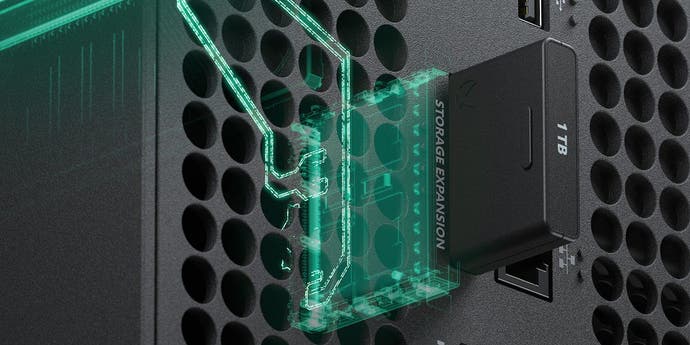
The approach of Xbox's Storage Expansion Cards feels closer to memory cards from 2-3 console generations back than a traditional hard drive, and offers the same performance as the internal SSD included with every Xbox Series X and S.
The Storage Expansion Card works as follows:
- The Storage Expansion Card acts much like any external drive; you can play games from it, move installs between internal and external drives, and set it as the default location to install games
- It's plug and play, and can also be inserted into another Xbox Series X or S you don't own to bring your installed games around with you
At launch, Seagate will be the official provider of Xbox Storage Expansion Cards, with a 1TB card available for purchase by the end of 2020.
This 1TB Seagate card is priced at $220 / £220.
You can see Digital Foundry inserting the Expansion Card below:
According to Digital Foundry, Xbox Storage Expansion Cards feel "rather heavy, likely down to the solid metal construction" which helps keep the temperature, and in turn performance, consistent.
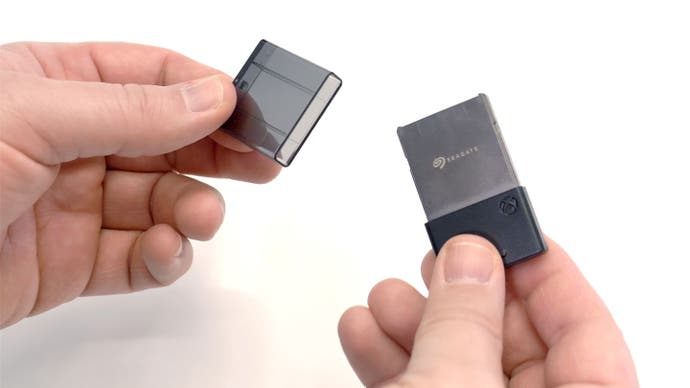
How you can expand Xbox Series X and Xbox Series X storage with USB 3.1 hard drives
As well as internal and external custom SSD solutions, traditional external USB 3.1 hard drives are also supported.
These drives can store and play Xbox backwards compatible games direct from the drive. If you have an external USB 3.1 drive on an Xbox One currently, that can be plugged into an Xbox Series X or S and work right away.
A USB 3.1 drive can also carry Xbox Series games as storage, which can be transferred to Series X or S's internal SSD or Storage Expansion Card to then be played.
Want to read more about the Xbox Series X? You can read our list of all confirmed Xbox Series X games, as well as Xbox Series X specs, the Xbox Series X console design and the Xbox Series X controller.
